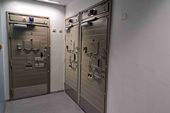Presentation for politicians and the press
"We are proud that we can now present our latest joint venture to the public and give an insight into our work in Egypt", explains Markus Müller, Managing Director at Toennjes. In addition to ambassadors from neighbouring countries such as Mali, high-ranking Egyptian politicians General Mohamed Salah El Din, Minister of State for Military Production, his predecessor General Mohamed Ahmed Morsi and Dr. Eng. Mohamed Abdel Karim, President of the General Authority for Industrial Development made their way to the opening ceremony. The German Embassy was represented by the Head of the Economic Department, Alexis Below. After a speech by Major General Eng. Mokhtar Abdelativ, President of the AOI, the guests were allowed to learn more about the production of the licence plates during a tour of the halls. General Abdelativ praised the good cooperation with the German partner company in front of the numerous press representatives and the advantages that will result from the technology transfer in the future. Finally, Mirjam Weber, Sales Director at Toennjes, showed the Toennjes Rain RFID-based recognition system for electronic identification of vehicles including ID-Eplates.
More flexibility and speed through technology
Egypt relies on the expertise from Toennjes. The new production facility covers the current licence plate requirements of the African state and operates independently and flexibly. Since both the AOI and Toennjes expect the market to grow, the joint venture is designed for larger production capacities and offers possibilities for expansion. "The fully automated production also ensures high quality and efficiency. We can largely exclude errors in the manufacturing process. Material losses remain low," explains Mirjam Weber.
In the new factory, which is located on the AOI premises, Toennjes uses its own ID-Erobot embossing robots for this purpose, which emboss the licence plates fully automatically. Toennjes has already successfully put the these into operation at other licence plate production facilities in Italy, Dubai or the Philippines. In addition, 60 jobs will be created in Cairo. "This makes Egypt less dependent on imports and creates jobs," Mirjam Weber continues.
Cooperation sealed after G-20 agreement
The starting signal for the joint venture in Egypt was given by the companies involved when they signed a cooperation agreement during "Compact with Africa". In November 2019, representatives of the African states and the G20 countries met at the German Chancellery to discuss cooperation and investment in Africa. An approach that is not new to Toennjes: The market leader for electronic vehicle identification (EVI) operates in more than 50 locations worldwide with joint ventures that strengthen the local economy and ensure reliable deliveries.
In addition to the ID-Erobot embossing robot, the Delmenhorst-based company develops the in-house RFID number plate ID-Eplate and the windscreen sticker ID-Estix. The number plates have Rain RFID chips with a unique identification number that can be read by authorities in stationary and moving traffic and compared with a vehicle database. The technology enables smart mobility applications such as access control or toll systems.
















